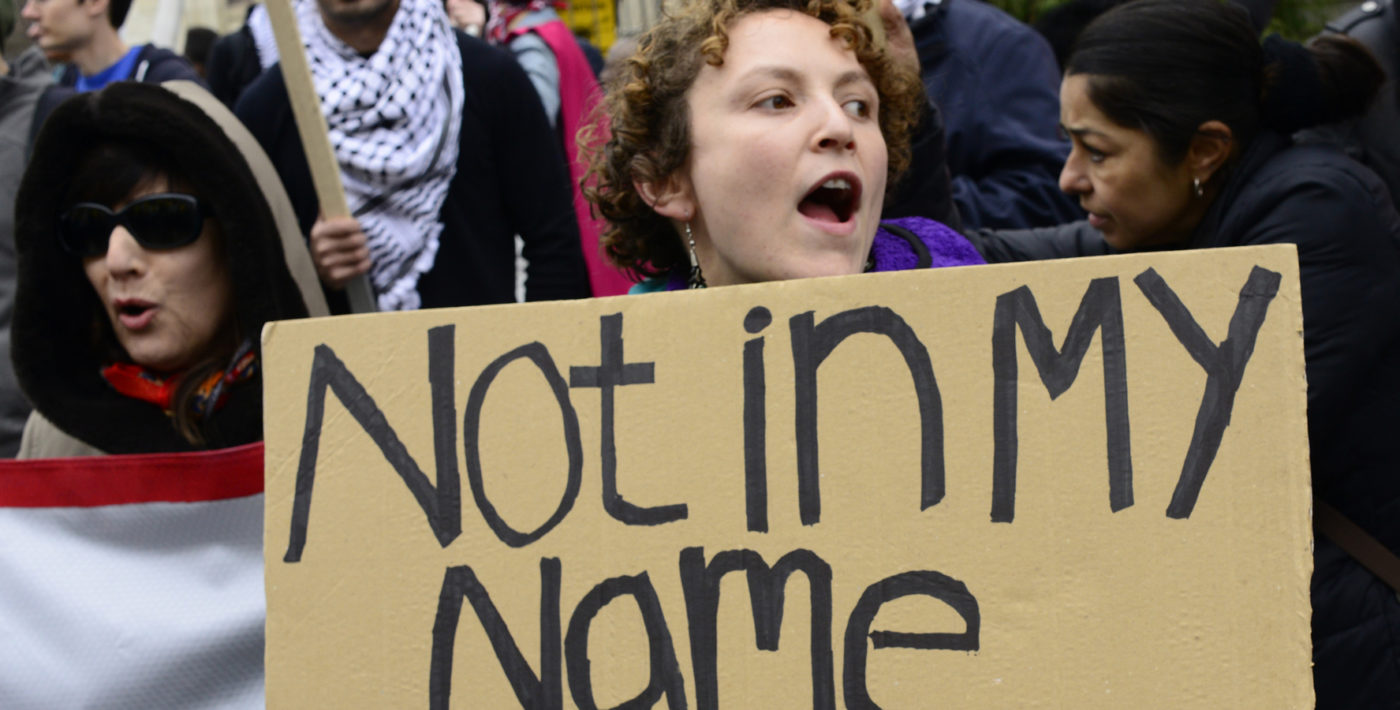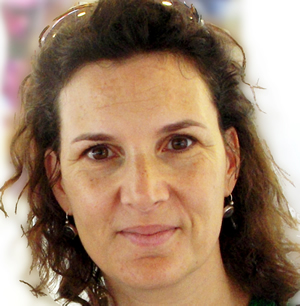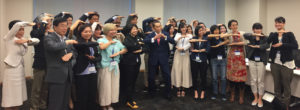Rebecca Vilkomerson’s background includes volunteering at a Guatemalan women’s cooperative in the mid-1990s alongside indigenous women who had all lost husbands to the violence of the civil war in that country. “I got schooled by those women on what U.S. policy does in the world – on the effects of colonialism and imperialism,” said Vilkomerson
Looking for a place where she could balance close family ties to Israel with concerns about the government’s human rights violations, Rebecca joined Jewish Voice for Peace in 2002. She sees “intersectionality and a straight directional line” between her experience in Guatemala and the human rights work she is doing now. Hear more from Rebecca Vilkomerson in our “Meet the Mobiliser” conversation:
“You have to build campaigns to build a movement, and you have to have a movement in order to build a campaign.”
How do you define goals and successes when you are organising a campaign?
You have to build campaigns to build a movement, and you have to have a movement in order to build a campaign. You don’t want to have a target that is so ambitious, there is no way to win; but you also don’t want to have a target so small that winning is insignificant.
There are also campaigns to help educate people, which is the first step to bringing people in before moving on to taking action. This is why I think consumer boycott can be very appealing. But also you have to think about next steps and escalation.
To sum up, when planning a campaign you need to:
- Choose the right target;
- Think of creative and fun actions;
- Think about escalation; and
- Bring lots of people along and get them more involved.
What is the biggest challenge you face right now?
As an organisation, our core goal is working for the freedom of all people in Israel and Palestine. At the same time, there’s a real imperative since Trump was elected president to be involved in domestic issues. So our attention is spread pretty thin over many issues.
“What’s hard for us is to challenge ourselves to stay focused on our core mission and not get distracted by the many urgencies around us.”
Many members want to get involved in other causes, like Black Lives Matter and Fight for 15, under the umbrella of Jewish Voice for Peace. What’s hard for us is to challenge ourselves to stay focused on our core mission and not get distracted by the many urgencies around us. At the same time, we want to take advantage of opportunities that do arise from that very urgency.
What is the one tool you cannot work without? Why?
The bottom line is that you need people on the ground who are willing to do things. There is no substitute for that. Adam Hochschild in Bury the Chains, his book about the fight against slavery, is instructive because those nineteenth century anti-slavery activists used the same tools we use—i.e., lobbying governments, building networks, creating support for a consumer boycott, direct actions.
Is there a new campaigning tool or tactic that you’re testing right now? What do you think of it so far?
Facebook Live is great and the internet is fantastic, but at the end of the day, we are using time-honoured and tested tactics. We know the ingredients for a successful campaign. Effective tactics can include everything from civil disobedience to an open letter, to obtaining celebrity support or creating street theatre.
I am not saying there is a template for campaigning. You have to be willing to think things through, to be super creative and look for an element of surprise. But I would rather learn from previous successes than try to re-invent the wheel.
“Facebook Live is great and the internet is fantastic but, at the end of the day, we are using time-honoured and tested tactics.”
Is there a recent campaign that you can point to as an example of how you successfully used specific tactics to achieve an identified target or goal?
We succeeded, through a concerted campaign over a period of nine months, in getting three U.S. senators to repudiate an anti-constitutional bill.
We launched a campaign in response to a bill that was introduced, under the sponsorship of AIPAC (a major lobbying organisation), to make boycotts of Israel illegal. JVP members held or attended well over 100 events with Members of Congress over the past nine months, raising their concerns about First Amendment issues. The ACLU came out against the bill because it is unconstitutional, as did MoveOn, and because it is a threat to political expression.
“Campaigns to help educate people are the first step to bringing people in before moving on to taking action.”
Investigative reporters drew on our research and experience to produce some excellent reporting that was published in prominent media outlets, receiving significant attention. During the August recess, JVP members convinced three senators to repudiate the bill publicly. One of them, Senator Gillibrand from New York, withdrew her sponsorship, which is totally unprecedented for an AIPAC bill. Videos of town hall encounters between JVP members and legislators went viral.
The bill is still in play, so it’s not quite a victory yet. But we are clearly making huge progress against a formidable opponent, changing the public conversation, and making elected officials understand that there is a cost, specifically among their own constituents, to supporting this kind of legislation. We achieved this by:
- Working in coalitions with both our usual allies and with less intuitive allies;
- Using old-fashioned media;
- Amplifying our media message via social media; and
- Most of all: old-fashioned organising.
It takes a lot of work for enough extremely well-prepared passionate people to show up at town halls across the country and to ask a question, especially when there are so many issues at stake at the moment. Our members really got a taste of their own power through this process.
What are three things an activist should be, have or know?
- A degree of humility, especially a willingness to learn and change your mind;
- A willingness to be in it for the long haul — not to be deterred by setbacks;
- The belief you are fighting for a better world.
What book did you read most recently—or are you reading right now?
I just finished The Return, by Hisham Matar. It is incredibly profound and has so much to say about the state of being in exile, about what state violence does to a family, and about that moment of hope at the beginning of a revolution. It’s a memoir, but it reads like a novel.
Is there an ongoing campaign that you find particularly interesting or inspiring?
There are a few right now. I think we’re seeing a golden age of mobilising.
- The Movement for Black Lives is very inspiring and necessary.
- The struggle at Standing Rock is powerful because it has such a sense of place: It’s about a piece of land, about the people who are there; and it reframes the issue of indigenous rights. There are very tangible, concrete things people want to get out of campaign. Stop the pipeline and get their land back is very clear.
- The Fight for 15, which is the fight for a minimum wage of $15 per hour, a living wage.
Do you have a favourite podcast?
I’m such a new podcast listener! But now I find myself listening much more when I walk the dog.
One that I really like is Still Processing, from the New York Times. Two African-American reporters who write about culture and technology, talk about politics, pop culture and art — but all through this young black lens. They’ll talk about everything from Rihanna’s new beauty line to Colin Kaepernick, to Harvey Weinstein — and all the cultural significance and structures they speak to. I find them to be two great personalities; they are friends who sometimes disagree, but who are inspired by one another.
I also like Treyf, a podcast hosted by radical young Canadian Jews who are having conversations about Jewish communal issues that I’m deeply involved in.
Who do you follow on social media for campaign news and insights?
For news out of Israel and Palestine I follow +972 Magazine and other people in the Israel-Palestine movement. The people I enjoy reading on Twitter are people who have insights, like [D.C.-based director of US Campaign for Palestinian Rights] Yousef Munayyer, who tweets smart insights and analysis and is fun to read.
What is it about your work that inspires or excites you?
Being on the right side of history. And I know that sounds grandiose! I was on sabbatical during the period leading up to the last presidential election. On the eve of the election I was on a conference call with the JVP leadership, planning what actions we should take. I was so grateful to have that outlet. It is an enormous privilege to have work that I care about and am passionate about, and which is meaningful. To a certain extent it is transforming the American Jewish community — or at least I hope it is. It is pretty rare to have that privilege of doing meaningful work.
Top photo by Stephen Melkisethian, flickr (CC BY-NC-ND 2.0).
Categories:
strategy




